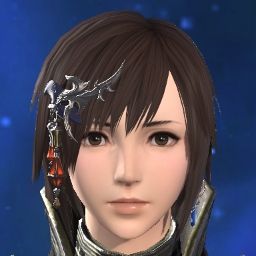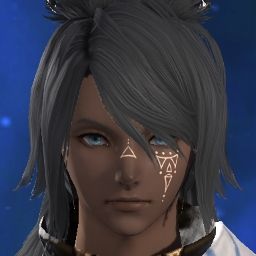That one I attribute to simply souls being willing to take any vessel they can find. So I wouldn't be surprised if one of our reflections was a Bangaa, an Amaljaa, a chocobo (wouldn't that be hilarious?), etc.
-
02-23-2022 07:22 AM #261Player

- Join Date
- Oct 2013
- Location
- New Gridania
- Posts
- 5,465
- Character
- Hayk Farsight
- World
- Exodus
- Main Class
- Dark Knight Lv 100
(1)
-
02-23-2022 07:38 AM #262
-
02-23-2022 07:46 AM #263
I'm thinking they probably migrated to some harsh, frigid environment (hence why they fur) with ferocious wildlife and had to adapt and become ferocious themselves to survive, gradually become more and more beastial over time.
Maybe lingering creation magicks are responsible for helping induce beneficial evolution.(1)
-
02-23-2022 08:10 AM #264
Venat does not take any joy in the prospect of causing destruction or destroying her world. Again, she thinks in the abstract, of an intangible sense of "beauty" that can only be sparked by "in deepest darkness, find light everlasting." That being said, she's willing to go ahead and do it on her ideological basis, because she thinks that's the proper way for people to live - to "become strong", again, "find true happiness." She doesn't relish the idea that the people she knows are headed down a bad path, or that she has to cull them, but more tellingly, she accepts that premise. I think that the fact that she takes, again, a two-sentence description as the basis of which to destroy her current world speaks to a confirmation bias.
She actually does lament its current state.The conversation with her at the observation facility suggests this as well. When she discusses the world she currently lives in, she doesn’t lament its current state, rather she expresses an undying love for it and it’s people. One born of a fundamental faith in humanity’s strength and virtue. It’s only after everything with Elpis, and the Final Days, that we see her speak of the Ancients and their inability find a way forward in their current state.
On Hermes, Venat says this:
She relates to his desire to oppose the world as it currently exists to the extent of anguish. She does go on to say that she still loves the world, and wants to save it, but of course - Hermes's anguish led him to a subconscious wish to destroy the world. Venat's led her to wish to change the people on it. Originally Posted by Venat
Originally Posted by Venat
The cutscene where Venat hears about the WoL's adventures and their world, and then talks about her own sort of strange, vaguely-defined divine revelation about the correct way to appreciate the beauty of the world, is also very interesting in light of Venat's decisions:
https://www.youtube.com/watch?v=J7MgvB7sxLU(9)Last edited by Brinne; 02-23-2022 at 08:14 AM.
-
02-23-2022 08:42 AM #265
I always took Hrothgar as being an example of how arbitrary the whole "beast tribe" designation is because there's almost nothing to distinguish them from races like the Lupin.
That and we already know the less-human races can be Echo bearers. It could just be that maybe Hydaelyn avoided choosing them simply because they would have a rougher time of things due to the discrimination they'd face.
...Though for that matter, now that she's gone, I guess that would mean people simply aren't going to awaken to the Echo anymore outside of others triggering it through artificial means akin to what Elidibus did...or more forcibly through processes like the Resonant. I think it would be interesting if we ran into a culture on one of the other continents where the Echo was a fundamental part of their society and something they knew how to awaken.(0)
-
02-23-2022 09:06 AM #266Player

- Join Date
- Feb 2019
- Location
- Ul’dah
- Posts
- 822
- Character
- Eara Grace
- World
- Faerie
- Main Class
- Paladin Lv 100
She accepts it due to the inescapable reality they find themselves in. One of the cornerstones of her outlook is a belief that one must look honestly and truthfully at the world one lives in. When she speaks of her own revelation she describes how “freed from presumption or prejudice, I saw the world through a newborns eyes. Everything fresh and new and so, so beautiful.” It’s why she doesn’t reject our story when Emet and Hythlo did and it plays into how she responds to Meteions breakdown, with her stating that Hermes has a right to hear Meteions report but that they should be there as well so he isn’t alone.
So rejecting the premise to her is the equivalent of rejecting gravity or time or any other constant. And that’s very different from believing her world needs to suffer out of preference for that state. One is a begrudging acceptance of the nature of existence, the other is a belief that it is right and good that people should suffer. Perhaps its not an important distinction in other peoples view, but it’s one that I think helps to define her character. The Sundering was a necessity in order to overcome the challenges ahead, not a good in it of itself.
I think that quote shows her struggling with a specific cultural norm, rather than being indicative of her distaste for the state of the world then. In her speech to us she actually reaffirms the Ancients way of thinking, stating that as soon as she feels she’s accomplished her purpose she’ll return to the star. It’s just that that purpose has a much longer path than the others. If she had felt that mankind can find it’s own way before stepping down, I don’t think she’d even be voicing that frustration.
I’m a particular fan of that speech, as well as the one from the (in)famous cutscene after Elpis. The way she describes how she came to love humanity is I think, regardless of anyones feelings on her beyond that scene, beautiful.(4)Last edited by EaraGrace; 02-23-2022 at 09:24 AM.
-
02-23-2022 09:19 AM #267
It was that sequence, as well as the joy she took in the sparring match against us, that really sold my vision of Venat as a kindred spirit to the WoL. It was like a version of us that had grown a bit and calmed down a little, but never stopped chasing the (eternal) wind or helping wherever she could. She really was an Azem.
(4)
-
02-23-2022 09:35 AM #268
Nobody decided it was an "inescapable reality" except for Venat. It was two sentences of description from a hostile source with no further context whatsoever. If Venat decides that the extremely vague description of the Plenty is enough to classify as "honest" and "truthful", then yes, it's her honest and truthful opinion that the current way the Ancients live is Bad, and the Sundered is Better. And if anyone disagrees with her, that must mean they're not "looking honestly and truthfully" at their world - and took it upon herself to correct them. It's interesting that that's the fallen world Venat hooks on in particular, when many were described - but the ones that fell to war and conquest and disease don't seem to deter her from embracing a newly created world that suffers from those same afflictions. Again, it speaks to an inherent ideology - one that's probably slowly being consciously realized before our eyes - and a confirmation bias.
Venat thinks of the ability to embrace suffering in terms of strength and weakness - those are her own terms. Those who can find "everlasting light in deepest despair" are "strong," and those who can't and succumb to the temptation of things being easier and with less sorrow, are "weak." And that the ability to not live according to that way of thinking bars one from "the path to true happiness." It's not simply about overcoming a specific obstacle. It truly is, to an extent, about virtue, about becoming strong, about a way of living. She talks about how our peoples' resilience in the face of hardship gives her heart - the condition for a strong people who "find a way forward" is, well, hardship. And, well, the suggestion her interpretation of a vague description is, to her, the equivalent of rejecting gravity or time - yeah, I think that about sums up the way she thinks, for better or worse.So rejecting the premise to her is the equivalent of rejecting gravity or time or any other constant. And that’s very different from believing her world needs to suffer out of preference for that state. One is a begrudging acceptance of the nature of existence, the other is a belief that it is right and good that people should suffer. Perhaps its not an important distinction in other peoples view, but it’s one that I think helps to define her character. The Sundering was a necessity in order to overcome the challenges ahead, not a good in it of itself.
If it was about a specific action, she wouldn't be tying it to Hermes's emotional state. She relates to his anguish, not his quirky nonconformity.I think that quote shows her struggling with a specific cultural norm, rather than being indicative of her distaste for the state of the world then. In her speech to us she actually reaffirms the Ancients way of thinking, stating that as soon as she feels she’s accomplished her purpose she’ll return to the star. It’s just that that purpose has a much longer path than the others. If she had felt that mankind can find it’s own way before stepping down, I don’t think she’d even be voicing that frustration.
It's an interesting speech, framed in inspiring ways - it's just that in hindsight, once you sort of pull back the vague terms in which she's speaking and the narrative framing, you can absolutely see the seeds of the elements that led her to choosing the path of Sundering and the subsequent Rejoinings. She thinks our world and our struggles sound cool and incredible and she wishes she could be there, and our world is one in which mankind's potential can shine, and that she had some kind of internal revelation that let her see and feel the world in a unique way she doesn't feel most others, sadly, share.I’m a particular fan of that speech, as well as the one from the (in)famous cutscene after Elpis. The way she describes how she came to love humanity is I think, regardless of anyones feelings on her beyond that scene, beautiful.(14)Last edited by Brinne; 02-23-2022 at 09:45 AM.
-
02-23-2022 10:08 AM #269
-
02-23-2022 10:22 AM #270
I suppose it never hit me before how truly weird it is for a person like Venat, having been raised in her society, to have such a positive, "golly gee, yipee" reaction to our travels. I'm not saying there's no fun or joy to be had in FFXIV, but the overarching plots and what motivates us tend to be relatively dark and serious? Like, what is Venat reacting to there? "And then his arm came clean off as he dashed at his former best friend in a rage!" or "He died in my arms, extolling me to never stop smiling as the blood burbled past his lips!" How about: "And then there was that time we fought primarily against a woman who watched her father be beaten to death in front her her when she was a child and another woman who was sold into sexual slavery by her family!"
Maybe we told her about Good King Moggle Mog and nothing else? I mean, she does seem to like cute, fluffy things, so perhaps that's her real motivation for the Sundering.(15)

 Reply With Quote
Reply With Quote















